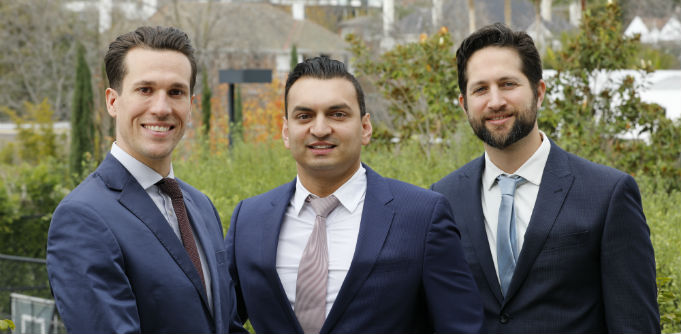
CannVaLate co-founders Darryl Davies, Sud Agarwal and Asaf Katz. Source: Supplied.
Founded little over six months ago, cannabis startup CannVaLate received its licence to sell medicinal marijuana just this month, but it’s already raised $4 million in Series A funding and is about to open its Series B.
The startup was targeting $1.5 million through the raise, with a high cap of $4 million, but was oversubscribed within just seven days.
CannVaLate provides a platform connecting suppliers of medicinal marijuana with the doctors who can prescribe it — and therefore the patients who could benefit from it the most.
Co-founder and char Sud Agarwal has a background as a medical doctor, specialising as an anaesthetist, and is also former medical director of ASX-listed medicinal cannabis company Cann Group.
He launched CannVaLate in April this year, alongside co-founders Darryl Davies and Asaf Katz.
The startup has also secured Nick Bell — founder of digital marketing agency WME and number 19 on the Australian Financial Review’s 2018 Young Rich List — as an investor and director of marketing.
Although medicinal cannabis was legalised in Australia in 2016, Agarwal tells StartupSmart there have only been about 1,300 subscriptions written, to date.
There are about 20 listed stocks in the cannabis space in Australia, he says, with a combined value of over $1 billion.
“In spite of that, almost all of them are pre-revenue,” he says.
There’s a working industry, and a market of those who could benefit from it, but “no one connected the two”, he adds.
“Very few patients are actually receiving it”.
Launching a startup that would act as a trusted middleman was “an overnight decision”, Agarwal says.
“There’s clearly an untapped market here.”
The platform connects patients to product through their existing doctors, rather than through third parties, while the startup also educates those doctors on the benefits and availability of medicinal marijuana.
Although the drug has been legal for two years, about 80% of the doctors Agarwal approached initially weren’t aware the legislation had changed, he says.
CannVaLate created technology that integrates with doctors’ existing desktop software, allowing them to prescribe medicinal marijuana where they feel it’s appropriate for their patient.
The startup has also developed an app that alerts doctors if their patient is suffering adverse effects from the drug, as “the effects on patients are very variable”, Agarwal says.
Previously, patients were able to self-refer to specialist medical marijuana clinics — a process that made many medical professionals sceptical.
CannVaLate is intended to put power back into the doctors’ hands.
“If you feel your patient is a good candidate, let us train you and give you the tools and the technology … and see if it works for them,” Agarwal says.
“It’s empowered them,” he adds.
Doctor’s orders
The majority of investors in the Series A round were individual doctors, Agarwal says, and he takes this as an endorsement.
If doctors think the venture has legs — enough to invest in it themselves — it’s likely they would use it to prescribe.
“We wanted proof-of-concept,” he says. If the startup had raised through a VC or other more traditional means, “the challenge will then be enlisting doctors”.
That round of funding has gone towards licensing for import, warehouse storage and transport of the cannabis. Warehouses have to be properly secured to prevent any drugs getting into the illegal market, and trucks have to be GPS tracked, he says.
They also spent the funds on developing the technology platform and app product.
Now, the founders have their eye on a Series B, which is pegged for hiring more staff and expanding the startup’s footprint. And, although he doesn’t name names, Agarwal says four investors that have pledged for the Series B are in the top 20 on the AFR’s Young Rich List 2018.
It’s about raising the money to be able to grow, “but it’s also really smart money”, Agarwal says.
“They have some skill sets that are quite hard to find, and they’re respected in their areas,” he adds.
When it comes to raising, there are three important things startups should focus on, Agarwal says.
First, “find the monetisation point very quickly”.
The CannVaLate founders knew they wanted to do something in the cannabis industry, but had to find a way to fix a specific problem there.
Once founders have identified a problem, the next thing to figure out is how to address it.
“It can be hard to see how to fix that problem,” he says.
Finally, it’s important for founders to identify any skill sets they may not have, and get the “best in class” in those areas on board. This is what led him to approach Nick Bell.
“Bringing in the real big guns to solve those problems was really helpful,” Agarwal says.


COMMENTS
SmartCompany is committed to hosting lively discussions. Help us keep the conversation useful, interesting and welcoming. We aim to publish comments quickly in the interest of promoting robust conversation, but we’re a small team and we deploy filters to protect against legal risk. Occasionally your comment may be held up while it is being reviewed, but we’re working as fast as we can to keep the conversation rolling.
The SmartCompany comment section is members-only content. Please subscribe to leave a comment.
The SmartCompany comment section is members-only content. Please login to leave a comment.